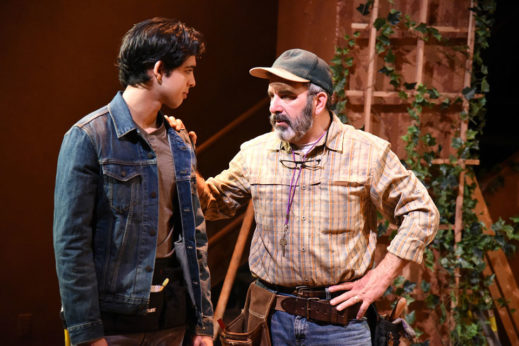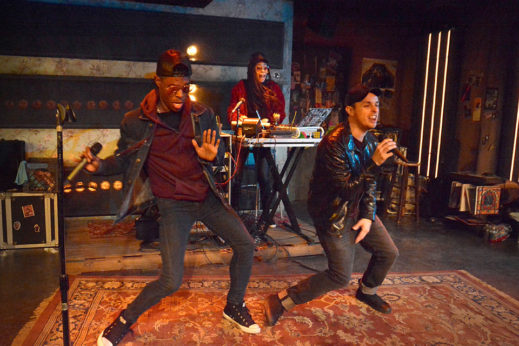
LOS ANGELES—Two new plays, one a world and the other a West Coast premiere, have just opened in L.A., both dealing sensitively and challengingly with the hot-button issues of our time—race, gender, and class. Ordinary people who think of themselves as pretty liberal and accepting, even progressive in their behavior and outlook, suddenly find themselves in the crosshairs of social contention. They can no longer reflexively fall back on their self-image as the good guys in this picture. Moral courage is asked for, but it’s not entirely clear what the moral thing is. A clear, direct, uncompromising stance is one way out of the dilemma, but the dilemma itself is ambiguous and multifaceted. It’s not surprising that each play ends with question marks as to what will ensue.
A viewer is reminded of all those well-honed aphorisms deploring the lack of character in difficult times: “First they came for the communists…” (Martin Niemöller) or Martin Luther King Jr.’s ”The hottest place in Hell is reserved for those who remain neutral in times of great moral conflict” (more MLK quotes along these lines here), not to mention the forceful commandment in Leviticus, “Do not stand idly by while your neighbor’s blood is shed.” Some of us remember the great topical protest songwriter Phil Ochs and his 1966 number “Love Me, I’m a Liberal” that pierced through smug pretense to make “gradualists” effectively indistinguishable from reactionaries. Or as the old joke went, “What’s a conservative? —That’s a liberal who’s just been mugged.”
The two plays are Jonathan Caren’s Canyon (seen Feb. 28), an IAMA Theatre Company partnership with the Latino Theater Company at downtown’s Los Angeles Theatre Center through March 24; and the Fountain Theatre’s award-winning “breakbeat play” by Idris Goodwin, Hype Man, continuing through April 14. Interestingly, each play is about 90 minutes in duration, with no intermission, packed from moment to moment with gradually unfolding, unsettling dissections of the human condition.
Canyon is a six-character play consisting of happily married Jake (Adam Shapiro) and Beth (Christine Woods)—he’s a househusband making improvements on their newly purchased home in a scenic canyon who wants “to fix the world,” she is a one-eighth Cherokee physician at County Hospital, and they’re expecting their first child. His African-American college buddy Will (Brandon Scott), a poorly compensated public defender in New York City, comes for a Labor Day 2016 weekend getaway with his wife Dahlia (Stefanie Black), who is primarily devoted to caring for their two young children, one of who has just been diagnosed as autistic; and the father and son team of undocumented Mexican handyman Eduardo (Geoffrey Rivas), who drinks a little too much to, as he says, stop thinking about his pain-in-the-neck wife, and Rodrigo, who plans to major in political science in college.

With a kind of diabolical genius, Caren intertwines all these characters in a whirlwind of secrets, pretenses, self-congratulation, doubt and accusation. What seems at first to be a fairly routine negotiation of roles in relationships becomes toxic after an unpredictable construction accident while Eduardo is at the house building a new retaining wall and enlarging the deck so that the view of the canyon will not be partial but complete. Jake and Eduardo show their cross-cultural male solidarity joking that “Every man wants a bigger deck, right?”
The setting in early September 2016 places it two months before Election Day purposely to emphasize that the racial and gender chasm was already deep even before everything in America changed. It helps to explain the title of the play: Only now, with the bigger deck, can we survey the whole canyon that separates people, homes and communities. Caren cleverly introduces an Indian arrowhead found in the soil that Eduardo is digging to suggest that the land on which sits the comfortable home Jake and Beth are remodeling was not only once part of Mexico but home to some of Mexico’s ancestral people.
These characters will never again live out the conventional American lives they thought they were living. “What’s happening in this play is happening in small ways all over our country,” says Caren. “I’m looking at the chasm between how we self-identify and how we behave as a culture. I’m interested in how a person acts when they’re tested beyond their ideals.”
New York-based director Whitney White integrates these six life stories with aplomb, camaraderie, friendship, respect and love all melting into distorted, funhouse mirror versions of themselves. “What happens to your morality when you feel threatened?” asks White. “Canyon is a reminder of just how vulnerable we all are.”
The playwright calls the African American director “the star of this production” insofar as she brings her own perspective of marginalization to the work, which is “all about prisms.”
Each of the six characters has their backstory, their gripes, resentments, and fears, and in the hothouse of theatre, they have no one on whom to turn but each other. What were thought to be settled issues in their own lives and in America are still roiling away and eroding everyone’s humanity. The ensemble is absolutely superb and flawless.
The imaginative scenic design by Dan Soule places the audience on three sides of the deck. We’re like all of America peering in on this sad, symbolic platform of the American reality now. Sitting in a front row, we could inhale the dust from Rodrigo’s cement mixing. Lighting design is by R. S. Buck, sound design by Jeff Gardner, costumes by Melissa Trn, and the prop master is Michael O’Hara.
Thoughtful viewers will go away with quite diverse opinions about the characters, about gender roles, about our immigration policy, about personal responsibility, I imagine—but no one will question the actors’ dedication and integrity. Playwright Caren has sought not merely to entertain but to provoke us into thinking what we might have done under the circumstances. I predict a broad appreciation for Canyon in further productions around the country.
Canyon plays through March 24 on Thurs., Fri. and Sat. at 8 pm, and Sun. at 4 pm at the Los Angeles Theatre Center, 514 S. Spring St., Los Angeles 90013. For tickets call (866) 811-4111 or go to thelatc.org/.
Hype Man
In this three-character play by Idris Goodwin and directed by Deena Selenow (seen March 2), set in a funky hip-hop recording and rehearsal studio, social injustice, racial identity, gender inequity, career ambition and friendship all converge—and collide.
We meet beat maker Peep One (Clarissa Thibeaux), a young woman of unspecific mixed ancestry tightly focused on her work creating the sound platform over which rap artists can compose their lyrics. The title character Verb (Matthew Hancock) gives support, almost like a backup singer in a singing group, to the frontman Pinnacle (Chad Addison), a Caucasian from Boston who has mastered the hip-hop idiom and is poised to make it big on national TV. The African-American character Verb, Pinnacle’s childhood friend, is aptly named: He is a man of action, even if sometimes too spontaneous and militant for his own good.
Peep One arrives late to rehearsal because of a high-speed police chase on the freeway in which many gunshots were fired. While getting ready for their breakout TV appearance, news reports start coming in of a police shooting of a black teenager named Jerrod. Peep One and Pinnacle sort of tsk-tsk the incident away as just another horrible killing, but Verb forces them to confront questions of race and privilege and demands that the group use their upcoming TV spot to register their protest. How many white artists will speak out?
This naturally opens up the whole theme of appropriation: a Caucasian performer adopting hip-hop, a preeminently African-American form of artistic expression, but perhaps betraying its anti-establishment ethos. Wearing her “The future is female” t-shirt, Peep One reminds Verb that he himself has participated in recordings with other performers who have put down women in the ugliest of terms, so where does he get the right to demand “political correctness” of other people? Besides which, she says to her two fighting colleagues, “Without me y’all wouldn’t be able to say a damn thing.”
Hype Man, winner of the 2018 Elliot Norton Award, is the third in Idris Goodwin’s series of “breakbeat” plays about hip-hop in America and the way that hip-hop has affected and reflects our personal relationships, dreams and aspirations, and politics.
“This one focuses on the question of responsibility,” Goodwin has said. “What does it mean to be a fan of this music and this culture? I’ve had a lot of friendships in my life that have been based on a shared love of hip-hop, a lot of friends of different races. Part of what brought me to hip-hop was the beats and the raps and all that, but also the spirit of it—the spirit spoke to me. [It’s] an art form that has roots in street organizations, that has roots in the Civil Rights Movement and the Black Arts Movement, that has been a tool for people from low-income areas to literally be able to change their lives for the better.”
Goodwin is not only a playwright but a director, orator, and educator with five rap albums to his credit. He is the producing artistic director of Stage One Family Theater in Louisville, Kentucky. “Black art,” he told American Theatre magazine, “is inherently about disruption—that’s what jazz is, that’s what hip-hop is. It’s all in this continuum of us finding ways to use art to be free.”
In Hype Man each character gets their monologue moment that helps us understand what events shaped them. These are welcome minutes of respite amongst an otherwise hyperactive, tense piece of theatre. In the end, we have to accept, as in Canyon, that no one really knows what it’s like to be (fill-in-the-blank)…Black, white, a woman, undocumented, pregnant, disabled, etc.
The creative team for Hype Man includes beat maker Romero Mosley, set designer James Maloof, lighting designer Chu Hsuan Chang, sound designer Malik Allen, costume designer Michael Mullen and prop master Shen Heckel. The production continues the Fountain Theatre’s strong identification with plays about social justice.

The printed program for Hype Man features two pages of background on the history of the hip-hop genre and the role of hype men in groups. It gives special attention to the subject of white rappers in hip-hop and their special responsibility. Writer Tatiana Isabel Gil quotes rapper and producer J. Cole’s song “Fire Squad” on the theme of appropriation to the effect that “white people have snatched the sound.” Cole goes on to say, “same rope you climb up on, they’ll hang you with.”
Deena Selenow is a director American Theatre magazine recognized as a “Person to Watch” for her adventurous approach to the performing arts and her dedication to diversity and inclusion practices in the American theatre.
As in Canyon, it’s simply not so clear how to proceed after a catastrophic event. What personal sacrifices are required? What takes responsibility? Is disruptive street action effective, or destruction of property? Is public exposure the right venue for political statements, and is targeted boycotting an acceptable outcome? Do we try to work through the system even when time after time the system disappoints? How far from the mainstream do we want to place ourselves? Are there limits to our compassion?
Hype Man runs through April 14, with performances on Fri. at 8 pm, Sat. at 2 and 8 pm, Sun. at 2 pm, and Mon. at 8 pm. Pay-What-You-Want seating is available every Mon. night in addition to regular seating (subject to availability). The Fountain Theatre is located at 5060 Fountain Ave. (at Normandie) in Los Angeles. Secure, on-site parking is available for $5. For reservations and information, call (323) 663-1525 or go to www.FountainTheatre.com.










